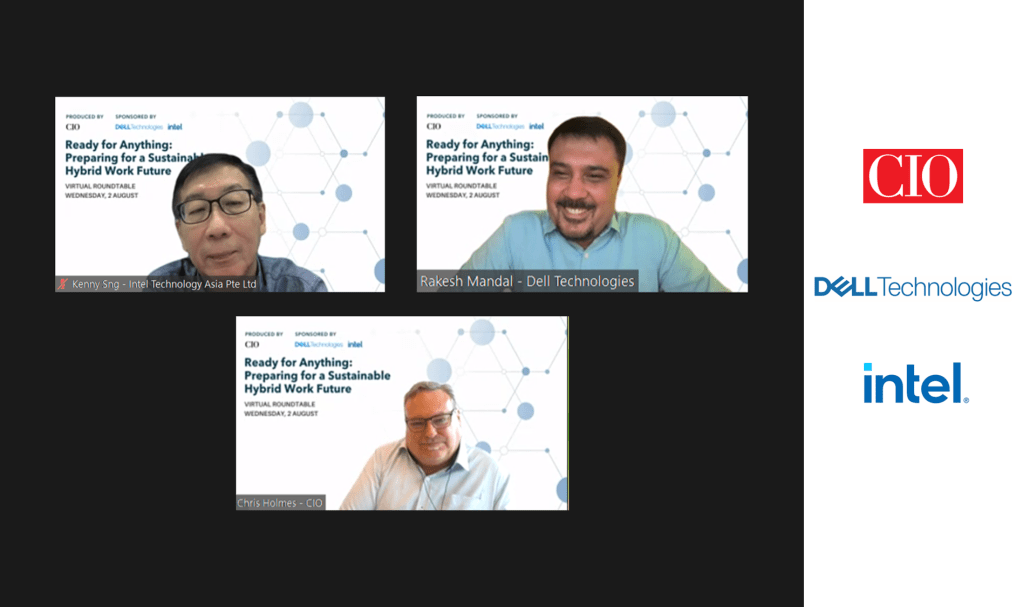
Change is a mainstay in today’s business landscape. Companies that want to stay agile and future-proof against potential disruptions need a clear, strategic vision driven by digital transformation. In particular, hybrid work is becoming key for adapting to changing business demands and market requirements, rather than a simple stopgap measure to tide them through the recent pandemic.
It’s in this climate that the virtual roundtable event, “Ready for Anything: Preparing for a Sustainable Hybrid Work Future”, was conducted on 2nd August, where we gathered Asia Pacific business leaders to discuss current and future prospects of sustainable hybrid work.
The roundtable event started with a discussion around the impact of hybrid work on business growth, with many business leaders seeing this move towards work-from-anywhere helping them accelerate innovation. In fact, 88 percent of global leaders interviewed in a survey believe that remote workers have as many—if not more—opportunities to innovate as compared to onsite staff. Moreover, companies that offer their frontline workers democratised access to digital collaboration, process automation, and other similar tools will see a 20 percent increase in productivity.
Beyond just productivity gains however, ensuring sustainability in the future of hybrid work is also critical. Rakesh Mandal, Senior Director and General Manager, CSG, for South Asia and Asia Emerging Markets at Dell Technologies, pointed out that sustainable innovation can deliver long-term value, with this intrinsically tied to an organisation’s digital transformation strategy. According to Foundry’s Digital Business Research 2023, 93 percent of organisations have either started adopting or already adopted a digital-first approach, driven by employee productivity and cost-saving objectives.
Hybrid work: more than just a stopgap
Business leaders at the event also shared their hybrid work experiences and the significant barriers to innovation. For instance, integrating the business architecture with an IT/OT infrastructure can be a challenge, while cybersecurity threats continue to loom over businesses due to a widening threat surface.
They further agree that these concerns must be addressed without impacting employee well-being or getting in the way of collaboration and communication within the office. Then there is the importance of data analytics, which can highlight and realise opportunities for innovation within sustainable hybrid work practices. Last but not least, offices remain crucial even in the hybrid work era, serving collaborative spaces to enhance productivity.
Behind the growing spotlight on sustainability
Global initiatives such as the annual United Nations Climate Change Conference are further intensifying climate change commitments to accelerate global climate action. As a result, organisations are increasingly acknowledging the need for business continuity, exploring ways to do their part while continuing to support their hybrid work models.
Even so, Dell recognised that roadblocks to adopting a sustainable hybrid work strategy persist. Business leaders highlighted change management, ensuring security, and building a business case for sustainable hybrid work to be some of the biggest challenges to implementing a sustainable hybrid work strategy.
“Resistance to change within the organisation and among stakeholders can hinder sustainability progress in hybrid work. Then there are security vulnerabilities, particularly with employees needing to access sensitive data outside of security firewalls,” explained Rakesh. “Cost concerns also mean that sustainable hybrid work would require investment in terms of time and resources.” Even as organisations are ramping up their digital strategies, several factors are slowing down their momentum toward sustainable hybrid work practices.
One way to address this issue is for businesses to employ purpose-built PCs, such as those with Intel vPro, which is designed to give IT greater control over PCs while boosting productivity. Features such as built-in remote management mean that IT can support employees working from anywhere, without accessing the endpoint physically.
“With optimised wireless connections and intelligent allocation of workloads tailored to applications, users can get the performance they need for any task,” said Kenny Sng, Chief Technology Officer for Malaysia and Singapore at Intel. “Such features, made possible by Intel vPro, can greatly facilitate sustainable hybrid work arrangements in a digital world, where the office is now everywhere.”
Preparing for the future of sustainable hybrid work
Driving their hybrid work strategies while keeping sustainability within view can feel like a delicate balancing act—a reality many business leaders acknowledged. Intel believes that achieving this balance can only happen through partnerships and alliances.
“The IT industry is complex and interdependent, and that is why Intel partners with software vendors to optimise applications for energy efficiency,” said Kenny. “But businesses can compute with confidence, as Intel is committed to responsible sourcing of minerals and advancing sourcing standards across the globe. We are pioneering green manufacturing processes, such as restoring 99 percent of freshwater used in our production process.”
Choosing the right technology partner, one that can help implement long-term, sustainable hybrid work, can make a significant difference. On that note, the event concluded with suggestions on what businesses can look out for in an IT partner, and how they can aid companies by delivering on these aspects of work:
● Delighting the end-user in enabling seamless collaboration and productivity, no matter where work happens
● Simplifying IT to pave the way for superior user experiences, with the most comprehensive lifecycle services and secure devices
● Advancing sustainability in a way that empowers organisations to make a positive impact, through innovative and sustainable products, packaging, services and solutions.
Learn how to empower your hybrid work strategies here.









